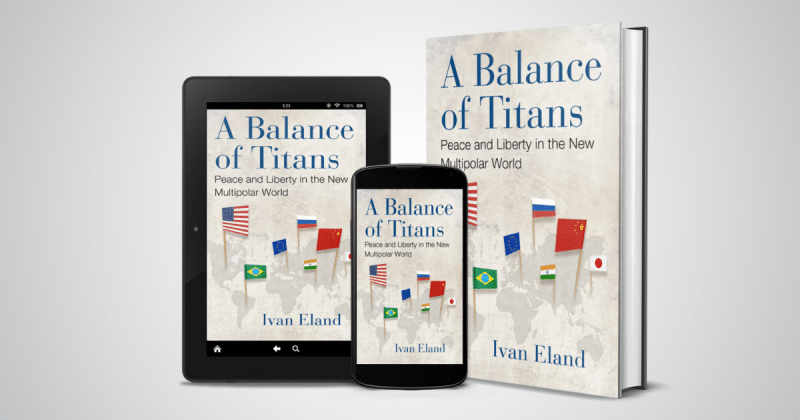Among the torrent of publications continually inundating the policy community and reading public, few are worth reading—between banality and bad ideas, most would have been better left unwritten. A notable recent exception to this general rule, however, is Dr. Ivan Eland’s most recent offering A Balance of Titans: Peace and Liberty in the New Multipolar World, recently published by the Independent Institute.
Eland, who spent years as a researcher, policy analyst, director, and commentator for the Congressional Budget Office, U.S. House Foreign Affairs Committee, Cato Institute, and Antiwar.com, and whose other works include War and the Rogue Presidency: Restoring the Republic after Congressional Failure and Domestic Causes of American Wars, is one of the rare public intellectuals not compromised by the War Party. Indeed, over the course of decades in the industry, Eland has stood out sharply for his consistent opposition to the growth of U.S. military budgets and security commitments in the wake of the end of the first Cold War, then the Global War on Terror, and the new age of “great power competition” ushered in under the Barack Obama and first Donald Trump administration.
His most recent offering is no exception to this rule, with plentiful criticism of Washington’s commitments to NATO, Ukraine, Israel, and various Southeast Asian states. In addition, as a libertarian, realist, and believer in the validity of the insights of public choice theory, Eland has choice words and searing critiques of the military-industrial complex and the influence of foreign lobbyists, writing for example, “The fate of Israel is not a strategic issue, but only a domestic issue for the United States.”
The real benefit of Eland’s latest book, however, particularly for those already well-versed in the details of all the ways the joint policies of the neoconservative and liberal internationalist establishment have failed over the past forty years, is that he offers positive policy prescriptions and brings the receipts to back them up. Whatever anarcho-capitalist, libertarian-realists might find to disagree with, this fact alone makes Eland’s book well-worth the read.
Coming in at a trim 130 pages, Eland quickly moves from summarizing and critiquing what went wrong, from playing global policeman, the doctrine of responsibility to protect, waging unwinnable wars, et cetera, to presenting an older, alternative way to view Washington’s place in the world, and to presenting a quantitative breakdown of what this might look like.
To this end, he proceeds to unapologetically embrace “publicly negotiated and defined spheres of influence in a proposed concert of great powers.” Despite any negative connotations to such an arrangement that may initially spring to mind, Eland goes to great lengths to show how this is the best an imperfect world can hope for. Here it is worth noting that the last time such a concert was established, at Vienna in 1814-1815, it kept the peace more or less successfully, preventing the globe-spanning conflagrations of the eighteenth and early nineteenth centuries, for generations.
Of course, giving other powers, from Russia, China, India, and the European Union the space to manage disputes, civil wars, or conventional wars that occur between states within their respective spheres, requires Washington to take a more constrained view of its place. To this end, and channeling his inner Charles Beard, Eland calls for Washington to “reduce its sphere from the entire world to Latin America, the Caribbean, the Western Atlantic, and Eastern Pacific,” a “return to the idea of US vital interests that was held by the US government prior to World War II.”
This policy, which he dubs “Independent Internationalism,” involves major retrenchment and reform. This is long overdue. And with Washington’s fiscal house in increasing disarray, the change in policy cannot come soon enough. As Eland shows, his new policy could be carried out at a yearly cost of just over $390 billion, roughly just 46% of the entire defense budget for fiscal 2025.
The United States faces no contiguous rival power that threatens its territorial integrity or sovereignty, and for those who still decry supposed distant threat of a rising China Eland is right to write, “The US ‘far-forward’ position in the Western Pacific to contain a rising China from becoming a regional great power has already failed and risks any conflict escalating to war with a nuclear armed state.” And, like this author, Eland points out that the example of Britain is instructive:
“As Britain did with America in the late 1800s, the United States should peacefully let China rise and fully assume the role of a great power on the world stage.”
Another theme Eland traces throughout, is the loss of liberty domestically as the empire increasingly comes home—both in terms of an oppressive national security bureaucracy, militarized police, blowback terrorism, and more.
How long will Americans continue to put up with this unnecessary and unhelpful state of affairs? If enough of them read Eland’s book, the answer will surely be not long.

































